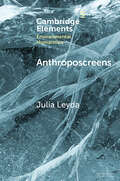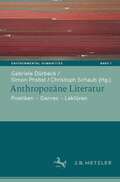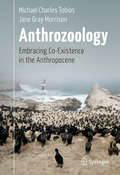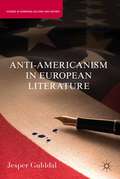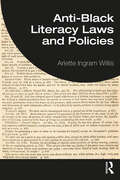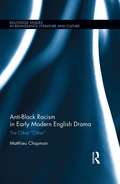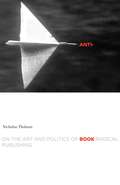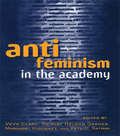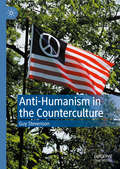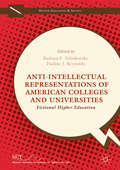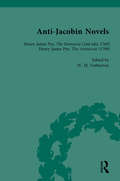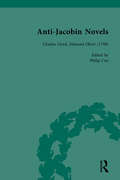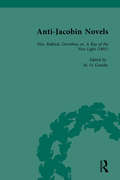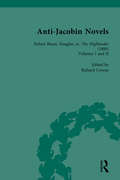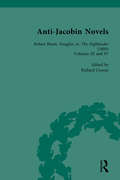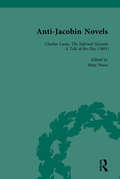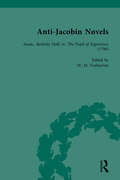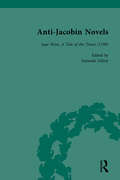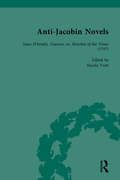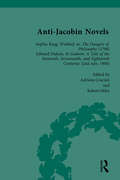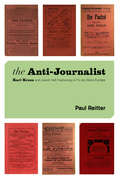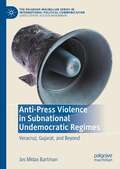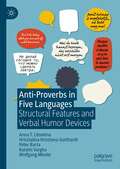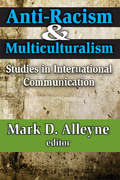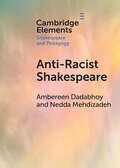- Table View
- List View
Anthroposcreens: Mediating the Climate Unconscious (Elements in Environmental Humanities)
by Julia LeydaAnthroposcreens frames the 'climate unconscious' as a reading strategy for film and television productions during the Anthropocene. Drawing attention to the affects of climate change and the broader environmental damage of the Anthropocene, this study mobilizes its frame in concert with other tools from cultural and film studies—such as debates over Black representation—to provide readings of the underlying environmental themes in Black American and Norwegian screen texts. These bodies of work provide a useful counterpoint to the dominance of white Anglo-American stories in cli-fi while also ranging beyond the boundaries of the cli-fi genre to show how the climate unconscious lens functions in a broader set of texts. Working across film studies, cultural studies, Black studies, and the environmental humanities, Anthroposcreens establishes a cross-disciplinary reading strategy of the 'climate unconscious' for contemporary film and television productions. This title is also available as Open Access on Cambridge Core.
Anthropozäne Literatur: Poetiken – Themen – Lektüren (Environmental Humanities #1)
by Gabriele Dürbeck Simon Probst Christoph SchaubDer sich seit 2000 etablierende Anthropozän-Diskurs begreift die Menschheit als geophysikalische Kraft. Wesentliche Strukturmerkmale dieses Diskurses und seiner Narrative sind das Einnehmen einer planetarischen Perspektive auf die globale Umweltkrise, eine tiefenzeitlich konstituierte Historizität, die Annahme unauflösbarer Wechselbeziehungen von Natur und Kultur und das Thematisieren ethischer Verantwortung des Menschen für das Erdsystem. Die literaturwissenschaftliche Forschung hat in den letzten Jahren das Anthropozän als geologisches sowie kulturelles Konzept aufgenommen und spricht zunehmend häufiger von ‚anthropozäner‘ Literatur. Der vorliegende Band mit 15 Beiträgen und einer Einleitung, die das Feld erstmals vermisst, stellt einen innovativen Versuch in der deutschsprachigen Forschungslandschaft dar, Ansätze zusammenzutragen, die die Rede von einer Anthropozän-Literatur in diesem entstehenden Forschungsfeld präzisieren, systematisieren und kritisch befragen. Dabei geht es um mögliche Poetiken und Genres. In Fallstudien (‚Lektüren‘) werden mögliche anthropozäne Lesarten ausprobiert.
Anthrozoology: Embracing Co-Existence in the Anthropocene
by Michael Charles Tobias Jane Gray MorrisonThis groundbreaking work of both theoretical and experiential thought by two leading ecological philosophers and animal liberation scientists ventures into a new frontier of applied ethical anthrozoological studies. Through lean and elegant text, readers will learn that human interconnections with other species and ecosystems are severely endangered precisely because we lack - by our evolutionary self-confidence - the very coherence that is everywhere around us abundantly demonstrated. What our species has deemed to be superior is, according to Tobias and Morrison, the cumulative result of a tragically tenuous argument predicated on the brink of our species' self-destruction, giving rise to a most unique proposition: We either recognize the miracle of other sentient intelligence, sophistication, and genius, or risk enshrining the shortest lived epitaph of any known vertebrate in earth's 4. 1 billion years of life. Tobias and Morrison draw on 45 years of research in fields ranging from ecological anthropology, animal protection and comparative ethics to literature and spirituality - and beyond. They deploy research in animal and plant behavior, biocultural heritage contexts from every continent and they bring to bear a deeply metaphysical array of perspectives that set this book apart from any other. The book departs from most work in such fields as animal rights, ecological aesthetics, comparative ethology or traditional animal and plant behaviorist work, and yet it speaks to readers with an interest in those fields. A deeply provocative book of philosophical premises and hypotheses from two of the world's most influential ecological philosophers, this text is likely to stir uneasiness and debate for many decades to come.
Anti-Americanism in European Literature (Studies in European Culture and History)
by Jesper GulddalPursues the hypothesis that fictional literature has been instrumental in the development and dissemination of European anti-Americanism from the early 1800s to today. Focusing on Britain, France and Germany, it offers analyses of a range of canonical literary works in which resentful hostility towards the United States is a predominant feature.
Anti-Black Literacy Laws and Policies
by Arlette Ingram WillisA COUNTERNARRATIVE This groundbreaking book uncovers how anti-Black racism has informed and perpetuated anti-literacy laws, policies, and customs from the colonial period to the present day. As a counternarrative of the history of Black literacy in the United States, the book’s historical lens reveals the interlocking political and social structures that have repeatedly failed to support equity in literacy for Black students. Arlette Ingram Willis walks readers through the impact of anti-Black racism’s impact on literacy education by identifying and documenting the unacknowledged history of Black literacy education, one that is inextricably bound up with a history of White supremacy. Willis analyzes, exposes, illuminates, and interrogates incontrovertible historical evidence of the social, political, and legal efforts to deny equal literacy access. The chapters cover an in-depth evolution of the role of White supremacy and the harm it causes in forestalling Black readers’ progress; a critical examination of empirical research and underlying ideological assumptions that resulted in limiting literacy access; and a review of federal and state documents that restricted reading access for Black people. Willis interweaves historical vignettes throughout the text as antidotes to whitewashing the history of literacy among Black people in the United States and offers recommendations on ways forward to dismantle racist reading research and laws. By centering the narrative on the experiences of Black people in the United States, Willis shifts the conversation and provides an uncompromising focus on not only the historical impact of such laws and policies but also their connections to present-day laws and policies. A definitive history of the instructional and legal structures that have harmed generations of Black people, this text is essential for scholars, students, and policymakers in literacy education, reading research, history of education, and social justice education.
Anti-Black Racism in Early Modern English Drama: The Other “Other” (Routledge Studies in Renaissance Literature and Culture)
by Matthieu ChapmanThis is the first book to deploy the methods and ensemble of questions from Afro-pessimism to engage and interrogate the methods of Early Modern English studies. Using contemporary Afro-pessimist theories to provide a foundation for structural analyses of race in the Early Modern Period, it engages the arguments for race as a fluid construction of human identity by addressing how race in Early Modern England functioned not only as a marker of human identity, but also as an a priori constituent of human subjectivity. Chapman argues that Blackness is the marker of social death that allows for constructions of human identity to become transmutable based on the impossibility of recognition and incorporation for Blackness into humanity. Using dramatic texts such as Othello, Titus Andronicus, and other Early Modern English plays both popular and lesser known, the book shifts the binary away from the currently accepted standard of white/non-white that defines "otherness" in the period and examines race in Early Modern England from the prospective of a non-black/black antagonism. The volume corrects the Afro-pessimist assumption that the Triangle Slave Trade caused a rupture between Blackness and humanity. By locating notions of Black inhumanity in England prior to chattel slavery, the book positions the Triangle Trade as a result of, rather than the cause of, Black inhumanity. It also challenges the common scholarly assumption that all varying types of human identity in Early Modern England were equally fluid by arguing that Blackness functioned as an immutable constant. Through the use of structural analysis, this volume works to simplify and demystify notions of race in Renaissance England by arguing that race is not only a marker of human identity, but a structural antagonism between those engaged in human civil society opposed to those who are socially dead. It will be an essential volume for those with interest in Renaissance Literature and Culture, Shakespeare, Contemporary Performance Theory, Black Studies, and Ethnic Studies.
Anti-Book: On the Art and Politics of Radical Publishing (Cultural Critique Books)
by Nicholas ThoburnNo, Anti-Book is not a book about books. Not exactly. And yet it is a must for anyone interested in the future of the book. Presenting what he terms &“a communism of textual matter,&” Nicholas Thoburn explores the encounter between political thought and experimental writing and publishing, shifting the politics of text from an exclusive concern with content and meaning to the media forms and social relations by which text is produced and consumed. Taking a &“post-digital&” approach in considering a wide array of textual media forms, Thoburn invites us to challenge the commodity form of books—to stop imagining books as transcendent intellectual, moral, and aesthetic goods unsullied by commerce. His critique is, instead, one immersed in the many materialities of text. Anti-Book engages with an array of writing and publishing projects, including Antonin Artaud&’s paper gris-gris, Valerie Solanas&’s SCUM Manifesto, Guy Debord&’s sandpaper-bound Mémoires, the collective novelist Wu Ming, and the digital/print hybrid of Mute magazine. Empirically grounded, it is also a major achievement in expressing a political philosophy of writing and publishing, where the materiality of text is interlaced with conceptual production. Each chapter investigates a different form of textual media in concert with a particular concept: the small-press pamphlet as &“communist object,&” the magazine as &“diagrammatic publishing,&” political books in the modes of &“root&” and &“rhizome,&” the &“multiple single&” of anonymous authorship, and myth as &“unidentified narrative object.&” An absorbingly written contribution to contemporary media theory in all its manifestations, Anti-Book will enrich current debates about radical publishing, artists&’ books and other new genre and media forms in alternative media, art publishing, media studies, cultural studies, critical theory, and social and political theory.
Anti-feminism in the Academy
by VèVè Clark Shirley Nelson Garner Margaret Higonnet Ketu H. KatrakContending that the anti-feminist backlash in the academy is part of the broader "politically correct" rhetoric, this collection of writers, academics and activists is a much-needed response to the assault on feminist thinkers and critics in the academy today.
Anti-Humanism in the Counterculture
by Guy StevensonThis book offers a radical new reading of the 1950s and 60s American literary counterculture. Associated nostalgically with freedom of expression, romanticism, humanist ideals and progressive politics, the period was steeped too in opposite ideas – ideas that doubted human perfectibility, spurned the majority for a spiritually elect few, and had their roots in earlier politically reactionary avant-gardes. Through case studies of icons in the counterculture – the controversial sexual revolutionary Henry Miller, Beat Generation writers Jack Kerouac, Allen Ginsberg and William S. Burroughs and self-proclaimed ‘philosopher of hip’, Norman Mailer – Guy Stevenson explores a set of paradoxes at its centre: between romantic optimism and modernist pessimism; between brutal rhetoric and emancipatory desires; and between social egalitarianism and spiritual elitism. Such paradoxes, Stevenson argues, help explain the cultural and political worlds these writers shaped – in their time and beyond.
Anti-Intellectual Representations of American Colleges and Universities: Fictional Higher Education (Higher Education and Society)
by Barbara F. Tobolowsky Pauline J. ReynoldsThis book explores popular media depictions of higher education from an American perspective. Each chapter in this book investigates the portrait of higher education in an exciting array of media--including novels, television, film, comic books, and video games--revealing the ways anti-intellectualism manifests through time. Examining a wide range of narratives, the authors in this book provide incisive commentary on the role of the university as well as the life of students, faculty, and staff in fictional college campuses.
Anti-Jacobin Novels, Part I, Volume 1
by W M Verhoeven Claudia L Johnson Philip Cox Amanda Gilroy Robert MilesA selection of Anti-Jacobin novels reprinted in full with annotations. The set includes works by male and female writers holding a range of political positions within the Anti-Jacobin camp, and represents the French Revolution, American Revolution, Irish Rebellion and political unrest in Scotland.
Anti-Jacobin Novels, Part I, Volume 2
by W M Verhoeven Claudia L Johnson Philip Cox Amanda Gilroy Robert MilesA selection of Anti-Jacobin novels reprinted in full with annotations. The set includes works by male and female writers holding a range of political positions within the Anti-Jacobin camp, and represents the French Revolution, American Revolution, Irish Rebellion and political unrest in Scotland.
Anti-Jacobin Novels, Part I, Volume 3: British Conservatism And The French Revolution (Cambridge Studies In Romanticism Ser. #48)
by W M Verhoeven Claudia L Johnson Philip Cox Amanda Gilroy Robert MilesA selection of Anti-Jacobin novels reprinted in full with annotations. The set includes works by male and female writers holding a range of political positions within the Anti-Jacobin camp, and represents the French Revolution, American Revolution, Irish Rebellion and political unrest in Scotland.
Anti-Jacobin Novels, Part I, Volume 4
by W M Verhoeven Claudia L Johnson Philip Cox Amanda Gilroy Robert MilesA selection of Anti-Jacobin novels reprinted in full with annotations. The set includes works by male and female writers holding a range of political positions within the Anti-Jacobin camp, and represents the French Revolution, American Revolution, Irish Rebellion and political unrest in Scotland.
Anti-Jacobin Novels, Part I, Volume 5
by W M Verhoeven Claudia L Johnson Philip Cox Amanda Gilroy Robert MilesA selection of Anti-Jacobin novels reprinted in full with annotations. The set includes works by male and female writers holding a range of political positions within the Anti-Jacobin camp, and represents the French Revolution, American Revolution, Irish Rebellion and political unrest in Scotland.
Anti-Jacobin Novels, Part II, Volume 10
by W M Verhoeven Claudia L Johnson Philip Cox Adriana Craciun Richard CroninA selection of Anti-Jacobin novels reprinted in full with annotations. The set includes works by male and female writers holding a range of political positions within the Anti-Jacobin camp, and represents the French Revolution, American Revolution, Irish Rebellion and political unrest in Scotland.
Anti-Jacobin Novels, Part II, Volume 6
by W M Verhoeven Claudia L Johnson Philip Cox Adriana Craciun Richard CroninA selection of Anti-Jacobin novels reprinted in full with annotations. The set includes works by male and female writers holding a range of political positions within the Anti-Jacobin camp, and represents the French Revolution, American Revolution, Irish Rebellion and political unrest in Scotland.
Anti-Jacobin Novels, Part II, Volume 7
by W M Verhoeven Claudia L Johnson Philip Cox Adriana Craciun Richard CroninA selection of Anti-Jacobin novels reprinted in full with annotations. The set includes works by male and female writers holding a range of political positions within the Anti-Jacobin camp, and represents the French Revolution, American Revolution, Irish Rebellion and political unrest in Scotland.
Anti-Jacobin Novels, Part II, Volume 8
by W M Verhoeven Claudia L Johnson Philip Cox Adriana Craciun Richard CroninA selection of Anti-Jacobin novels reprinted in full with annotations. The set includes works by male and female writers holding a range of political positions within the Anti-Jacobin camp, and represents the French Revolution, American Revolution, Irish Rebellion and political unrest in Scotland.
Anti-Jacobin Novels, Part II, Volume 9
by W M Verhoeven Claudia L Johnson Philip Cox Adriana Craciun Richard CroninA selection of Anti-Jacobin novels reprinted in full with annotations. The set includes works by male and female writers holding a range of political positions within the Anti-Jacobin camp, and represents the French Revolution, American Revolution, Irish Rebellion and political unrest in Scotland.
The Anti-Journalist: Karl Kraus and Jewish Self-Fashioning in Fin-de-Siècle Europe (Studies In German-jewish Cultural Histor Ser.)
by Paul ReitterIn turn-of-the-century Vienna, Karl Kraus created a bold new style of media criticism, penning incisive satires that elicited both admiration and outrage. Kraus’s spectacularly hostile critiques often focused on his fellow Jewish journalists, which brought him a reputation as the quintessential self-hating Jew. The Anti-Journalist overturns this view with unprecedented force and sophistication, showing how Kraus’s criticisms form the center of a radical model of German-Jewish self-fashioning, and how that model developed in concert with Kraus’s modernist journalistic style.Paul Reitter’s study of Kraus’s writings situates them in the context of fin-de-siècle German-Jewish intellectual society. He argues that rather than stemming from anti-Semitism, Kraus’s attacks constituted an innovative critique of mainstream German-Jewish strategies for assimilation. Marshalling three of the most daring German-Jewish authors—Kafka, Scholem, and Benjamin—Reitter explains their admiration for Kraus’s project and demonstrates his influence on their own notions of cultural authenticity. The Anti-Journalist is at once a new interpretation of a fascinating modernist oeuvre and a heady exploration of an important stage in the history of German-Jewish thinking about identity.
Anti-Press Violence in Subnational Undemocratic Regimes: Veracruz, Gujarat, and Beyond (The Palgrave Macmillan Series in International Political Communication)
by Jos Midas BartmanThe global trend of increasing violence against the press has spurred research interest into the questions of where, why, and how communicators are repressed. As a result, scholarship has demonstrating that hybrid regimes - which mix undemocratic and democratic elements - constitute a specifically dangerous and lethal context for these actors. Decentralized countries, in which some subnational political elites have retained authoritarian features, have been identified as the most perilous context for communicators. However, despite the burgeoning interest in illiberal practices and repression on the subnational level, it is still relatively unexplored how and why subnational political elites repress communicators within their multi-level setting. The author argues that communicators in subnational undemocratic regimes who can spread the scope of compromising information beyond subnational boundaries can cause uncertainties for subnational undemocratic regimes. The book explores how the political elites of these regimes repress these communicators in response.
Anti-Proverbs in Five Languages: Structural Features and Verbal Humor Devices
by Wolfgang Mieder Anna T. Litovkina Hrisztalina Hrisztova-Gotthardt Péter Barta Katalin VarghaThis book is the first comparative study of English, German, French, Russian and Hungarian anti-proverbs based on well-known proverbs. Proverbs are by no means fossilized texts but are adaptable to different times and changed values. While anti-proverbs can be considered as variants of older proverbs, they can also become new proverbs reflecting a more modern worldview. Anti-proverbs are therefore a lingo-cultural phenomenon that deserves the attention of cultural and literary historians, folklorists, linguists, and general readers interested in language and wordplay.
Anti-racism and Multiculturalism: Studies in International Communication (Studies In International Communication Ser.)
by Mark D. AlleyneAll scholarly books are engagements with the existing literature, often the published scholarly work of one established discipline. This book originated with modest objectives, to produce a work that would be in conversation with the literature of international relations even though not of relevance only to that field. The professed goal of international relations is international peace. The ethical lens of pondering the best means to achieve world peace is used to filter media content in the field of multiculturalism and anti-racism. Although there has been little work on the impact of racial difference on the contours of contemporary international order, there has been a sizeable body of research intended to abolish the credibility of pseudo-scientific racism. Such racism has provided the ideological foundation and justification for imperialism, colonialism, the holocaust, and apartheid. Race has been debunked as a myth. Because of this, racism - the ideology bred of human classification according to racial difference - has been found to be intellectually and morally barren. But the need to communicate egalitarian and scientific sentiments remains. The contributors to this volume consider five questions: How does the literature on antiracism improve our understanding of conflict resolution? How does the analysis of the media's role in racist and anti-racist discourses improve the process of theorizing on hate and war propaganda? How can research on anti-racist discourse improve UN peacekeeping? What implications does this subject have for theory-building and cultural diversity? How and why should the literature on anti-racism expand research in international relations? This is a unique, worthwhile framework for cross-disciplinary research in race and intellectual consensus and conflict.
Anti-Racist Shakespeare (Elements in Shakespeare and Pedagogy)
by Ambereen Dadabhoy Nedda MehdizadehAnti-Racist Shakespeare argues that Shakespeare is a productive site to cultivate an anti-racist pedagogy. Our study outlines the necessary theoretical foundations for educators to develop a critical understanding of the longue durée of racial formation so that they can implement anti-racist pedagogical strategies and interventions in their classrooms. This Element advances teaching Shakespeare through race and anti-racism in order to expose students to the unequal structures of power and domination that are systemically reproduced within society, culture, academic disciplines, and classrooms. We contend that this approach to teaching Shakespeare and race empowers students not only to see these paradigms but also to take action by challenging and overturning them. This title is also available as Open Access on Cambridge Core.
